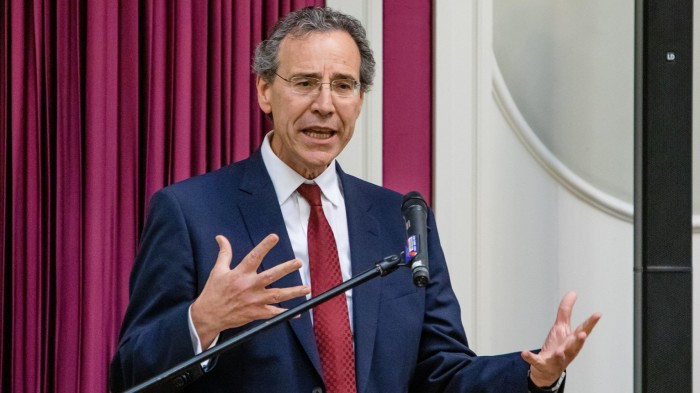Unlock the Editor’s Digest for free
Roula Khalaf, Editor of the FT, selects her favourite stories in this weekly newsletter.
Germany’s ambassador to the UK has expressed hopes that next month’s EU-UK summit will be just the start of a warming of relations and could lay fertile ground for a future review of Boris Johnson’s post-Brexit deal.
Miguel Berger said that while much depended on the “level of ambition of the British government”, the EU would be open to discussing options when former prime minister Johnson’s Trade and Cooperation Agreement comes up for a scheduled five-year review in 2026.
Leaders at the May 19 summit in London will initially agree a new EU-UK defence and security pact and a communiqué setting out a package of reforms, which both sides hope to negotiate by the end of 2025.
Those areas include a youth mobility deal, energy co-operation, streamlining of border controls for foodstuffs and the mutual recognition of professional qualifications.
But Berger said that if the talks in May were successful, they could pave the way in 2026 for a second wave of reforms when London and Brussels review the operation of the TCA, which took effect in January 2021.
Berger told an evidence session organised by the cross-party UK Trade and Business Commission last week that the summit would be only the “starting point” of negotiations.
“It’s very important that the review of the TCA that comes next year is a process that is politically connected,” he said.
Some in Brussels see the TCA review as a mainly technical exercise and believe the deal is working well, but other diplomats think there is scope to make it work better in the interests of both sides.
Prime Minister Sir Keir Starmer’s “red lines” — which rule out Britain returning to the single market, customs union or free movement — are also significant obstacles and Berger said: “We obviously accept the red lines as they were defined.”
But he added: “In the end, for us, it’s the question of the level of ambition of the British government. If the British government would like to move further, we are open to discuss that.
“Let’s start with what’s on the table. These are very substantial points. My hope is that once we move forward on these topics, we will hopefully create a dynamic of co-operation that may allow us to go further than what’s currently on the table.”
Throughout the EU-UK reset process under the Labour government, Germany has been an enthusiastic promoter of deeper engagement with the UK. Berlin’s appetite for closer ties has often exceeded those of both British politicians and the central EU bureaucracy in Brussels.
In January 2024 Berlin submitted a discussion paper to the European Commission, the bloc’s executive arm, which advocated improving the ability of both young people and professionals to work in the UK and EU, in a sign of its intentions to deepen relations with Britain.
As well as youth mobility for 18- to 30-year-olds, the paper, seen by the Financial Times, said that if the coming discussion on mobility between the EU and UK “were to have a broader focus”, it could include a raft of provisions to help business-to-business exchanges.
These included reduced costs and paperwork for German businesses looking to second employees and their families to work in the UK, easier terms for rotating NGO workers and extended visas for salaried professionals and the self-employed.
While, from a trade perspective, the current reset talks remain tightly limited to a so-called veterinary agreement to remove border red tape for food and plant exports and a move to reconnect EU and UK energy markets, trade groups would like to see more ambition over time.
In December, the British Chambers of Commerce set out a trade manifesto demanding more flexibility for business travellers, a VAT co-operation agreement, rejoining the Pan-Euro-Mediterranean trade agreement and aligning on industrial regulations, among other ideas.
Thus far Brussels has rebuffed requests by the UK for deeper integration into the EU single market unless the UK accepts broader obligations including paying into EU budgets and accepting elements of EU law.
Chancellor Rachel Reeves at the weekend signalled her support for a youth mobility deal, telling the Sunday Times that “we do want to enable young people from Europe and the UK to be able to work and travel overseas”. But she cautioned that net migration must fall.
Anton Spisak, associate fellow at the Centre for European Reform think-tank, said “the real stumbling block to getting privileged access to the single market is mobility of people”.




